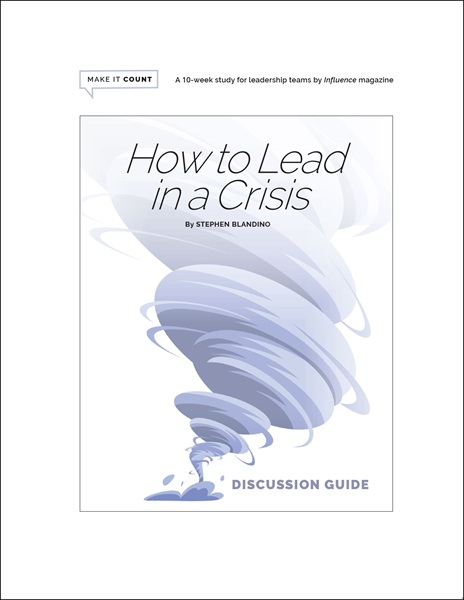How to Lead in a Crisis
A 10-week study for leadership teams
Years ago, my wife heard someone say, “You can count on a major crisis hitting your life every 10 years.”
At the time, she thought that sounded a bit hyperbolic. Yet over the past 10 years, we’ve experienced multiple crises.
First, we dealt with a major health scare just 18 months after planting our church. My heart’s mitral valve unexpectedly ruptured, requiring emergency cardiac surgery followed by six weeks of recovery.
Then we navigated the disruption of COVID. During the pandemic, more than 40% of our congregation left and never returned. We finally started growing again only recently.
Along the way, we’ve also experienced several smaller crises that required bursts of attention.
The long-term impact on us and our ministries has a lot to do with
how we manage crises.
Painful events and seasons test our leadership and stretch personal and church resources. Nevertheless, when a crisis happens, responding to it isn’t optional.
The long-term impact on us and our ministries has a lot to do with how we manage crises.
This installment of Make It Count offers 10 lessons on leading through crises. Before exploring those, consider four elements of crisis management.
Attitude
We can’t always control circumstances, but we can maintain a healthy attitude amid difficulties.
During a crisis, it’s crucial that pastors keep emotions in check; balance optimism and realism; and lead with prayer, empathy, and deeply rooted values.
Failing in any of these areas will only make the crisis worse.
Assessment
Crisis assessment happens in stages.
At first, events tend to move quickly. This is the time to evaluate and address the immediate threat.
As the crisis continues to unfold, further analysis yields deeper insights. These discoveries help leaders create a strategy for moving forward.
Assembly
Crises are too big for one person to manage. Leaders must assemble a wise and diverse team to address the issues thoroughly and effectively.
Team members help the lead pastor carry the load. They also provide wisdom, perspective, and counsel during plan formulation and recovery implementation.
A crisis management team includes not only internal staff, board members, and key leaders, but also outside voices, such as other pastors, legal advisors, and experts in various fields.
Action
Crises require an active response.
When a crisis emerges, leaders take immediate steps to ensure everyone is safe.
However, a long-term response must include clear planning, congregational care, regular communication, and financial preparation.
These are the broad categories of crisis management. The 10 lessons unpack the overall response in greater detail.
While discussing those lessons with your team, keep in mind that the insights are not in sequential order.
Rather, this study identifies principles that apply to the entire crisis-response process. Each principle plays a critical role in helping you lead well through whatever crises may arise in your ministry.
This installment of Make It Count unpacks 10 essential qualities for leading in a crisis. To view the PDF, click on the image below.
Adapted from the Winter 2025 issue of Influence magazine.
Influence Magazine & The Healthy Church Network
© 2025 Assemblies of God


